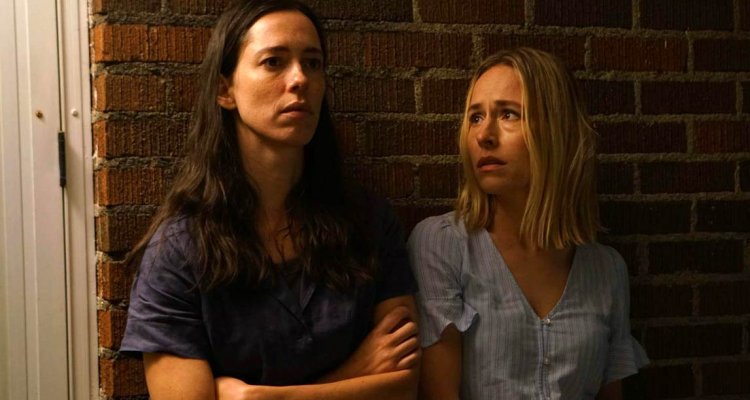With sequences of sustained eeriness, in which the flesh creeps relentlessly off your bones, and one-two-three-punch jump scares so effective you practically trip over the skin you’ve just leaped out of, David Bruckner‘s Sundance midnight title “The Night House” does a very good job of parting you from your epidermis. But while it often frightens the bejaysus out of you, Bruckner’s sophomore feature, after 2017’s “The Ritual,” doesn’t rely on schlock tactics. Instead, it’s classed up by DP Elisha Christian‘s rich, trompe-l’oeil photography; between this and “Columbus,” Christian should now be the go-to cinematographer for films that find a spiritual dimension in the crisp lines of modernist architecture. And for a horror movie that flirts (and eventually goes steady) with overkill in terms of the sheer variety of demons, both actual and metaphorical, that manifest in every imaginable form to taunt our beleaguered heroine, it’s unusually grounded and characterful. Go ahead and file that under “Rebecca Hall can make us believe anything.”
READ MORE: Tessa Thompson Boards Rebbeca Hall’s Directorial Debut “Passing”
Hall plays Beth, who at the start of the film is returning from her husband Owen’s funeral, to the exact kind of lakeside dream home that people should know by now not to build if they don’t want to end up getting thoroughly haunted. At the very least, don’t hang the bloody wind chimes. All reflective surfaces, hardwood floors, and full-height windows that stare dolefully out at placid gray-green water fringed with dense pine forest, the house was designed by Owen (Evan Jonigkeit) and includes a little wooden jetty, where a rowboat is moored. It was in this boat, in the middle of the lake, that Owen shot himself using, as grieving schoolteacher Beth explains snappishly, “a gun that I didn’t even know we owned.”
There turns out to be a lot that Beth didn’t know about Owen, despite 14 years of marriage. And for quite a while the supernatural aspects of the screenplay—written by Ben Collins and Luke Piotrowski, the duo also behind 2017’s coming-of-age downer “Super Dark Times“—are either downplayed or plausibly deniable as Beth’s grief-stricken, brandy-addled dreams. Meanwhile, the real-world mystery of Owen’s suicide unfurls in a breadcrumb trail of sinister clues: his deranged-sounding suicide note; his phone’s innocuous-seeming snapshot of Beth (or someone who looks a lot like her); his oddly annotated layout sketches for their house (or one that looks a lot like it).
READ MORE: Our 25 Most Anticipated Sundance Film Festival Premieres
The “was it real or was it all a dream” chestnut has been roasted quite a few times before in this genre. But Bruckner’s approach is subtler and more disquieting — the momentary relief we may feel when Beth wakes up in the cold light of day after some cavalcade of night terrors has less sustain than the lingering mood of the terrors themselves. And on a more granular level, Bruckner never cheats us with cheap “it was only the cat”-style fake-outs. Aided by David Marks’ exceptional, knife-edge editing—and sound design that deploys effects, soundtrack cuts, and Ben Lovett‘s score with all the soothing restfulness of a Guantanamo torture program—Bruckner has the filmmaking confidence to follow through on his scary build-ups with often unfeasibly frightening reveals. (There were a lot of hands over faces at the film’s midnight premiere, though I’m proud to say I resisted the urge to cover my eyes, and instead just squinted them near-shut which made everything blurry and probably more terrifying as a result).
READ MORE: Here Are the Best Horror Films of the 2010s
In being a female-led horror film-slash-haunted house pic that’s really (slight sigh) about grief, “The Night House” follows in the mysterious disembodied footsteps of Jennifer Kent’s “The Babadook” and Ari Aster’s “Hereditary.“ This is not bad company to be in, even if “The Night House” doesn’t quite reach the heights (or plumb the depths) of those two recent touchstones. But where it really can stand with them is in the quality of the lead performance. Hall’s Beth, very unusually for a horror heroine, is actually given a personality outside of her hauntedness. She’s not merely a vessel for a terrifying, potentially supernatural series of occurrences, but a skeptical, intelligent, sarcastic woman who has snarky interactions with her co-workers and a realistically flinty but warm relationship with her best friend (an excellent Sarah Goldberg). And Hall inhabits Beth entirely—not an easy task when the character herself fears she may be out of her mind—all of which works in the moment to bind even the most outré of the narrative’s uncanny detours to some recognizable version of the real world. There’s even a faint #metoo undercurrent to her scene with Stacy Martin‘s bookseller character, which threatens momentarily to give the film some unexpected topicality.
READ MORE: “Scare Me” Is a Solid Sundance Midnighter
Inevitably, though, that texture fizzles away when, like so many horrors (“Hereditary” included), “The Night House” has to choose between an ambiguous and an explanatory third act, and ends up stumbling between those two stools. Opting for a climax still replete in scares (and commendably subtle CG) that’s yet both overdetermined and logically unsatisfyingly, and that also, without spoiling anything, feels like a last-minute swerve away from the braver ending that more naturally beckons, Bruckner’s elegantly crafted film falls some way short of its grandest ambitions, but still sends you out into the night with a chill in your bones and the hairs stiff on the back of your neck. [B]
Follow along for all of our coverage from the 2020 Sundance Film Festival here.

